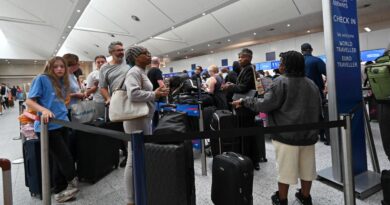EasyJet CEO Johan Lundgren to step down next year
The boss of Britain’s biggest budget airline, easyJet, will leave in less than a year.
Chief executive Johan Lundgren will have served seven years at the helm of easyJet as it endured its most turbulent times since its launch in 1995: the consequences of the UK leaving the European Union, followed by the Covid pandemic.
Mr Lundgren, who joined in December 2017 will be replaced at the start of 2025 by the current chief financial officer, Kenton Jarvis.
The announcement to the Stock Exchange said: “Johan is expected to step down from the board and as chief executive on 1 January 2025. He will remain with the business until the conclusion of his notice period on 16 May 2025.”
The carrier’s share price fell by almost 6 per cent as the markets opened.
The outgoing CEO said: “I congratulate Kenton on being nominated my successor, it is fully deserved, and I will work closely with him and the whole executive team to achieve this year’s goals and hand over responsibilities smoothly at the end of the year.
“There are important things still to accomplish over the balance of the year, but when the time comes I will leave easyJet with a great sense of loyalty and of pride at the progress made and the potential the company has for the future.”
The chair of easyJet, Sir Stephen Hester, praised Mr Lundgren for “steering the company through the immense challenges of the Covid period”, as well as “setting up a clear strategy and strong execution plan towards its ambition of ‘being Europe’s most loved airline’”.
Mr Jarvis said: “I am a huge believer in the future for our airline, which is powered by the talents and enthusiasm of our front-line staff.”
Ryanair, easyJet’s biggest rival, has been led by chief executive Michael O’Leary for 30 years.
News of Mr Lundgren’s departure accompanied easyJet’s half-year results for 2024. The airline lost £350m in the six months between October 2023 and March 2024 – about £9.50 for each of the 36.7 million passengers flown.
Winter losses are normal for budget airlines, and the figure represents a £61m improvement on a year earlier, with 12 per cent more capacity.
For the key three months of summer 2024 – July, August and September – sales and fares are ahead of 2023 levels.
Mr Lundgren said: “We are now absolutely focused on another record summer which is expected to deliver strong [full-year] earnings growth and are on track to achieve our medium term targets.”
The airline will re-open its base at Southend airport at the start of the aviation summer season in March 2025.
The Essex base was closed, along with Stansted and Newcastle, in August 2020. John Upton, chief executive of London Southend Airport, said: “This move is indicative of the demand from people in the east of London, Essex and the wider East Anglia region.
“Our dedicated on-site rail station is less than one hour from central London; only 43 minutes from Stratford, London with connections to the Elizabeth Line; and only 100 paces from the terminal door.”
Aviation analyst Sean Moulton said: “The return of an easyJet base to London Southend, five years since its closure, will boost the viability of the airport.
“With limited direct competition, easyJet will have a near-monopoly on flights from London Southend – which is similar to 2012 when the airline first launched.”
The airline will serve a range of European and North African destinations from Southend, including Marrakech in Morocco and Enfidha in Tunisia.




